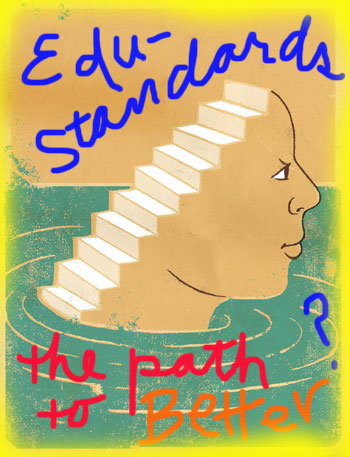
After a year of working, a panel of educators released a set of proposed common academic standards on Wednesday. The panel—which published its work under the banner of Common Core State Standards Initiative—formed its standards at the direction of 48 state governors and commissioners (including California’s).
The panel’s proposal has been released “for public comment”—a nice admission that we are all in this together, and that dictating from on high has not been all that successful in the past.
The idea is to replace the checkerboarded standards that are inconsistent from state to state.
The standards seem, on first bounce, to be both sensible and sophisticated, pushing for a level of critical thinking and genuine knowledge in both English and Mathematics that goes beyond simple skills and memorization. (A cheering concept!)
The NY Times has more:
….adoption of the new standards would set off a vast new effort to rewrite textbooks and standardized tests.
“I’d say this is one of the most important events of the last several years in American education,” said Chester Finn, Jr., a former assistant secretary of education who has been an advocate for national standards for nearly two decades. “Now we have the possibility that, for the first time, states could come together around new standards and high school graduation requirements that are ambitious and coherent. This is a big deal.”
The proposed standards lay out a blueprint of the concepts and skills students should learn year by year as they make their way through the public schools. In English, for instance, they say that fifth graders should be able to explain major differences between drama and prose stories, and refer to elements of drama like casts of characters, dialogue, and stage directions when writing or speaking about specific works of dramatic literature, among other skills.

Unfortunately, too often a focus on “critical thinking” means neglect of memorization and development of basic skills (such as memorization…). I hope that students in math, at least, will still have to be able to work problems and do their own arithmetic and algebra. Critical thinking can be developed with “word problems” along with the rote learning needed to deeply ingrain the fundamental skills.
Of course, we knew how to do all this very well 100 years ago. We just decided no to.
I don’t disagree with you, John. Basic skills first. But then let’s build kids who are friendly with logic.
At very quick first glance, this report didn’t seem to have the horrid fuzziness that you’re talking about. But I looked at it very, very quickly.
“Of course, we knew how to do all this very well 100 years ago. We just decided not to.”
100 years ago at least 20% of the population was illiterate, only about 6% of the population graduated from high school and 90% of DOCTORS had no college education. The good old days.
You teach your way and we’ll teach our way. We don’t need one size fits all for the nation and world. Did you know that the South really won the War Between the States?
I figured that out when Newt Gingrich became Speaker of the House.